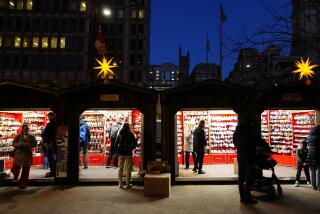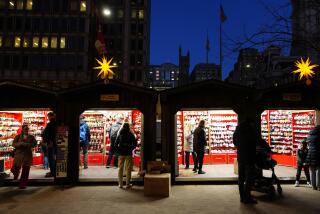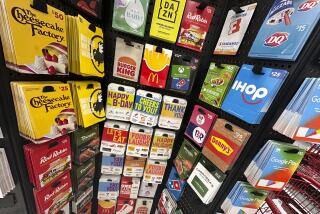Self-gifting by consumers is on retailers’ wish lists
Trinkel De La Paz, 24, loves this holiday’s deep discounts because they’re enabling her to be a more generous Santa.
To herself, that is.
The Silver Lake graphic designer bought herself an iPad mini and some clothes discounted on Cyber Monday, and she’s not done. De La Paz said she feels free to splurge on herself because she has extra money from a recently landed job, a new apartment waiting to be spruced up and only one present to buy for her family’s Secret Santa exchange.
“These prices are only happening this time of year,” she said. “I might as well stock up now.”
Come Christmas, many shoppers decide to treat themselves to a little (or sometimes not-so-little) something extra. Some do it to take advantage of irresistible promotions. Others buy an item as a gift and then decide they want another for themselves.
This fine art of giving to oneself at the holidays, dubbed self-gifting by retail pollsters who track such behavior, has become a key indicator for how merchants will fare once the post-Christmas tallies come in.
“The willingness of the shopper to push her budget beyond what she had originally planned is a key influencer for holiday growth,” NPD Group analyst Marshal Cohen said in a blog post. “In fact, the self-gifting indicator has made the difference between growth and decline.”
Cohen reasons that each year, the number of gifts Americans expect to give remains roughly the same, making their tendency to buy presents for themselves a more accurate gauge of their economic circumstances. And during the recession, when spending declined, “one of the leading factors that saved retailers was an increase in self-gifting” by consumers taking advantage of big holiday bargains, Cohen said.
A third of consumers ages 25 to 64 will self-gift before Christmas, according to a survey from Chase Blueprint and AOL. On Instagram, the #selfgifting hashtag brings up photos of polka-dot heels, a Mac mini computer, a KitchenAid stand mixer, lingerie, cosmetics and more.
“The Grinch won’t be the one to steal or even save Holiday 2013,” Cohen said. “It will be the self-gifting consumer.”
But this year, the behavior is on the decline, as shoppers already accustomed to making do with less money shrink from the head winds of continued economic uncertainty.
Some 57% of consumers told the National Retail Federation that they will take advantage of deals during the holidays to buy items that aren’t gifts for others. Last year, 59% of respondents said the same.
Self-gifters will spend an average of $129.62 on themselves during the season, down from a survey high of $140.43 last year and $137.17 the year before. The bulk of their budgets will go toward presents for family members; they’ll also buy gifts for friends and co-workers while shelling out for holiday food, candy, greeting cards, flowers and decorations.
Shoppers may be more savvy about saving this year, having been indoctrinated by the recession to hunt for deals, said Lars Perner, an assistant professor of marketing at USC. And retailers are making it easy for consumers to spend less, as they extend Black Friday-style doorbuster deals well into December in an effort to maintain momentum and clear inventory before January.
“The pressure to buy at any one time, such as Black Friday, has really dissipated because you can buy ahead of time and after the fact,” Perner said. “So this year, there may have been fewer impulse purchases made.”
Also, Perner said, consumers might be stressed by the prospect of increased healthcare and food expenses in the new year, he said.
“Self-gifting is more discretionary, involving things you buy when you can afford them, so one would suspect that it has a stronger correlation with the overall state of the economy,” he said. “If it declines, it would be a negative sign, because people will put off purchases they’re looking at for themselves. If things are going well, people will buy more for themselves.”
Top retailers, sensing an opportunity for substantial revenue, are increasingly urging shoppers to be more selfish.
Self-gifting appeals from companies abound on Twitter. On Dec. 9, Best Buy told consumers to buy the Galaxy S4 smartphone for $49.99 as “a gift for yourself!” On Dec. 3, Guess tweeted that “free shipping is the perfect gift for yourself this holiday season!”
A day earlier, Tiffany & Co. touted its diamond solitaire earrings to its followers, saying that “of course, a gift for yourself is well deserved this year!” Even before Black Friday, Target was marketing its $5 sleepwear by tweeting “gift one and get one for yourself.”
Roku told shoppers in a commercial that the only surefire way to land one of its media streaming players on Christmas was to buy it for themselves. The company suggested that self-gifters tell people the Roku present was sent to them by a fictional Ukrainian named Moxkat Grvida.
Long Beach photographer and blogger Crystal Heller, 29, said she appreciates ads that target longtime self-gifters such as herself.
“Retailers are always saying to buy things for other people, but what about yourself?” she asked. “I deserve a lot too.”
Already this holiday, Heller has spent some $250 treating herself to jeans from Kate Spade Saturday, a candle set, tea at Teavana. She said she tends to buy items she won’t purchase the rest of the year, when the merchandise and prices aren’t as good.
“It just feels nice to buy something for yourself for Christmas,” she said. “After all, you’re going to be getting a lot of other things from people that you won’t love.”
Twitter: @tiffhsulatimes







